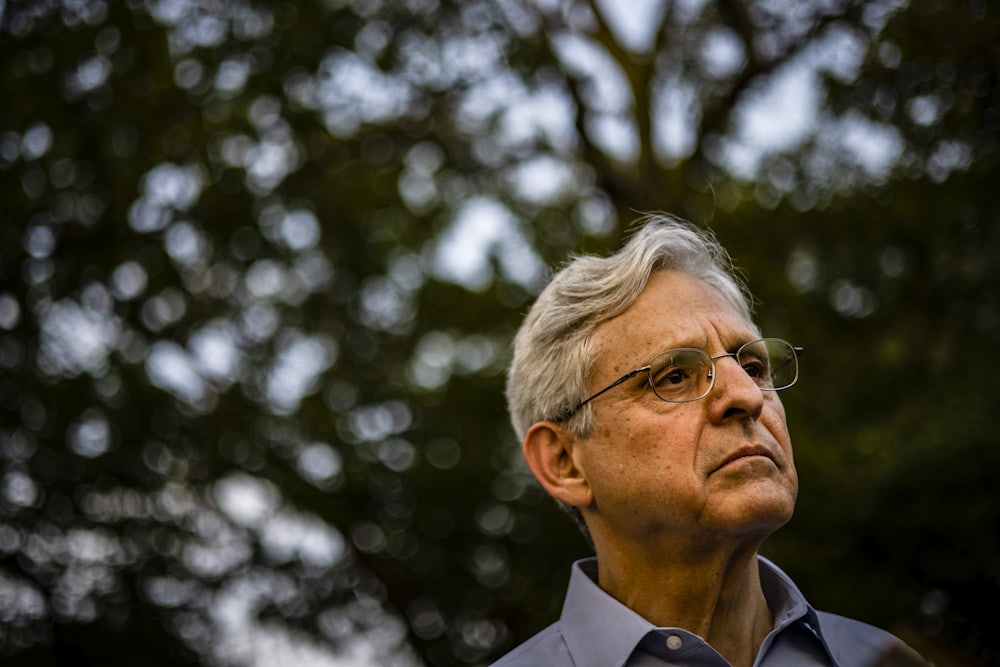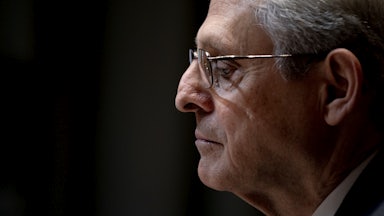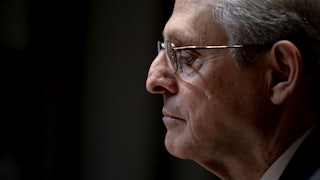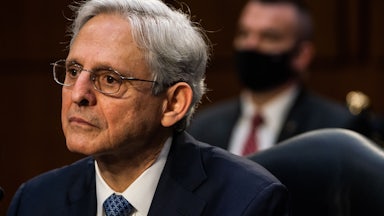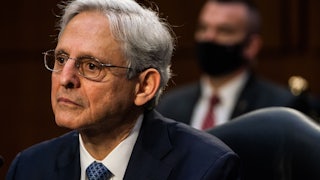A lot of people are mad at Attorney General Merrick Garland these days. Much of it comes from predictable quarters. For instance, earlier this month, Garland announced he would create a federal task force to address a “disturbing” recent surge in “harassment, intimidation, and threats of violence” against school board members and educators. Republican lawmakers and right-wing parents, who hope to foment a suburban backlash to Democrats ahead of next year’s midterms, tellingly took it as a personal attack on them and lashed out accordingly.
But other critics of the attorney general are more surprising. Among the most prominent recent ones is California Representative Adam Schiff, a top House Democrat and a member of the House January 6 committee. Schiff told Yahoo News’s Michael Isikoff on Tuesday that he disagreed with what he saw as Garland’s reluctance to bring charges against former President Donald Trump for alleged criminal offenses.
“I think there’s a real desire on the part of the attorney general, for the most part, not to look backward,” Schiff told him. “Do I disagree with that? I do disagree with that, and I disagree with it most vehemently when it comes to what I consider even more serious offenses.” He pointed to a phone call in which Trump directly pressured Georgia Secretary of State Brad Raffensperger to “find” more than 11,000 nonexistent votes for him that would help him overtake Biden’s lead in the state—an undisguised bid to manufacture the electoral fraud that Trump so regularly decries.
Schiff suggested that the lack of criminal consequences for Trump would create a double standard in American law enforcement. “Because I think, if you or I did that, we’d be under indictment by now,” Schiff went on to say. “In my view, you don’t ignore the crimes that have been committed by a president of the United States. They need to be investigated. You may reach the judgment once you’ve investigated something that the public interest in not prosecuting a former president outweighs the interests of justice. But I don’t think you could ignore the crimes.”
It’s worth noting two things right off the bat. First, as Schiff himself conceded, a federal investigation into Trump’s crimes may actually be underway but not publicly known. He and other Americans may have grown accustomed over the last few years to regular reporting about investigations into and imminent charges against various Trump associates. While the absence of that reporting now could be taken as a sign that such investigations do not exist, it is also not conclusive proof of their nonexistence.
Second, and perhaps more importantly, anyone who expected Merrick Garland to be a fervent anti-Trump crusader set themselves up for disappointment. An attorney general is not supposed to make all of someone’s dreams come true, not even those of the president who nominated them. Those who held the office between Watergate and Trump have generally concluded that leading the Justice Department imposes unique responsibilities and constraints, especially compared to other Cabinet members, who have a much freer hand. They reached this conclusion after Richard Nixon’s first three attorneys general were, in order, charged with multiple Watergate-related crimes, pressed to resign for their role in a separate scandal, and ousted during the Saturday Night Massacre.
Trump’s two permanent choices for the job—Jeff Sessions and Bill Barr—often struggled to maintain a certain ethical distance from the White House, to say the least. Barr was especially willing to serve as Trump’s legal hatchet man. The consequences for the Justice Department’s integrity, as well as public confidence in the rule of law, were dire. Biden’s choice of Garland earlier this year was a conscious effort to reverse that trend and mitigate the damage. “I am not the president’s lawyer,” Garland told senators during his confirmation hearing. “I am the United States’ lawyer.”
What could Trump be charged with? Earlier this month, two former Clinton administration officials argued in Just Security that Garland should reopen the obstruction of justice case against Trump from the Mueller Report. At the time, Mueller effectively punted on whether to bring charges against Trump for obstruction of justice because of the perceived constitutional issues of prosecuting a sitting president. That left Barr and Deputy Attorney General Rod Rosenstein to make the decision, and they publicly announced that no charges would be brought. Since the statute of limitations has not yet expired on those offenses, Garland could theoretically reverse them.
Schiff, for his part, noted that Trump was already effectively listed as an unindicted co-conspirator in the campaign-finance charges brought against former Trump lawyer Michael Cohen in 2018. “So what’s the argument that the guy that did the coordinating and did the directing gets a pass?” he said. “[In] my view, in light of Nixon being pardoned, the Justice Department taking a position you can’t prosecute a sitting president—which I also disagree with—to say now that, as a practical matter, you can’t prosecute a former president would make the president above the law. And that’s a dangerous proposition in the abstract. Given that Trump is, I think, already running for president again, it’s an even more dangerous prospect for the future.”
Beyond his two impeachment trials, which are noncriminal proceedings, Trump has not been personally charged with any state or federal crime since he became president. But there are multiple investigations underway that could carry potential legal liabilities for Trump. The Manhattan district attorney’s office charged the Trump Organization and its chief financial officer, Allen Weisselberg, in July for their role in what prosecutors described as a long-running tax fraud scheme. The New York Times reported earlier this week that the district attorney’s office for Westchester County, New York, has subpoenaed records from Trump’s golf resort there, reportedly as part of an inquiry into whether Trump and his company manipulated the property’s assessed value for favorable tax treatments.
As for the Trump-Raffensperger call, there are no public reports that the Justice Department is investigating Trump for any criminal conduct in the matter. If it is not, it’s possible that federal prosecutors are deferring to an investigation by Fulton County District Attorney Fani Willis. Her office has reportedly obtained documents from the Georgia secretary of state’s office and conducted multiple interviews with witnesses. But that may not satisfy some of Garland’s critics. “I suspect that they’re counting on the Fulton County D.A. to do justice, and I don’t think that is how we ought to view the magnitude of that effort to overturn the election,” Schiff told Yahoo News.
In fairness, Garland’s Justice Department hasn’t exactly been quiescent when it comes to other Democratic priorities. In June, the department sued Georgia to block multiple provisions of a new state law that sought to impose a wave of new voting restrictions, its most aggressive pushback yet against the national surge in voter-suppression laws. And in September, it filed a lawsuit to challenge a Texas law that uses a form of bounty hunting to evade judicial review and effectively ban abortion in most cases throughout the state. A motion to block the Texas law from taking effect while legal proceedings unfold is currently pending before the Supreme Court.
There is also one area where Garland appears particularly willing to take forceful action: the January 6 attack on the Capitol by a pro-Trump mob. That unprecedented attack on American democracy has shadowed Garland’s entire tenure as attorney general; Biden’s announcement that he would nominate Garland came one day after the attack. In prepared remarks for his testimony before the House Judiciary Committee on Thursday, Garland said that federal agents had arrested more than 650 people for storming Capitol Hill. In July, the Justice Department also declined to represent Alabama Representative Mo Brooks in a lawsuit that alleges he helped incite the riot, arguing that he was acting in a personal capacity instead of an official one.
But it remains to be seen just how far Garland’s aggressiveness on January 6 will go. A growing chorus of commentators is urging him to pursue criminal contempt charges against Trump adviser and pardon recipient Steve Bannon for refusing to testify to the House committee on his role in the attack. “Should Garland fail to quickly initiate a contempt prosecution against Bannon once it gets to his doorstep, it will be a signal that Trump loyalists will continue to have impunity in breaking the law,” Slate’s Jeremy Stahl wrote earlier this week. “It could also be an invitation for them to commit more crimes against the democratic process in the future.” It could also come to nothing: The time it would take for contempt charges to work their way through the courts could very well push the matter past the midterm elections, at which point a newly installed Republican House majority would likely pull the plug on the investigation itself.
I’ve written before that the Justice Department should not hesitate to pursue criminal charges against Trump and his allies if they are warranted. There is certainly no shortage of incidents where Trump himself appears to have broken the law, and further scrutiny may unearth more of them. Biden could have nominated an attorney general who shared that priority. Instead, he opted to nominate someone with a well-worn reputation for thoughtful moderation and a clear mandate to depoliticize the Justice Department as an institution. If Garland chooses a less combative path toward Trump and his allies, it would be an unsurprising decision on his part—and a deeply unfortunate one for everyone else.
